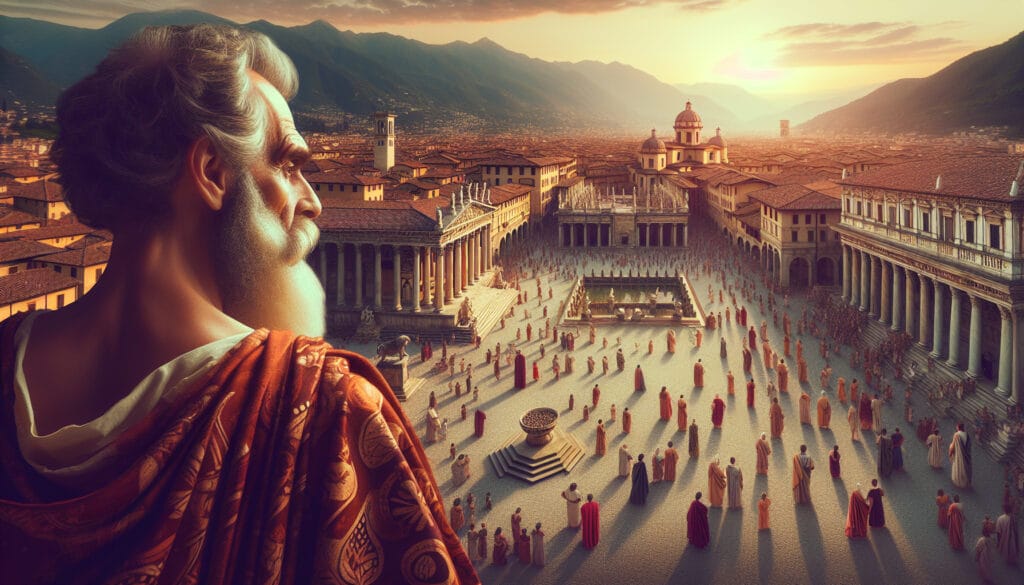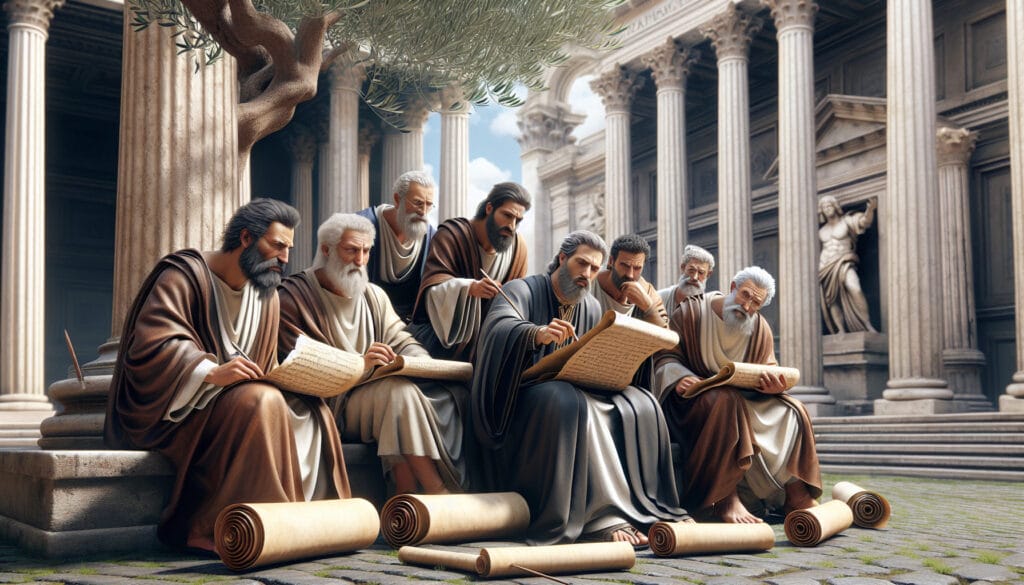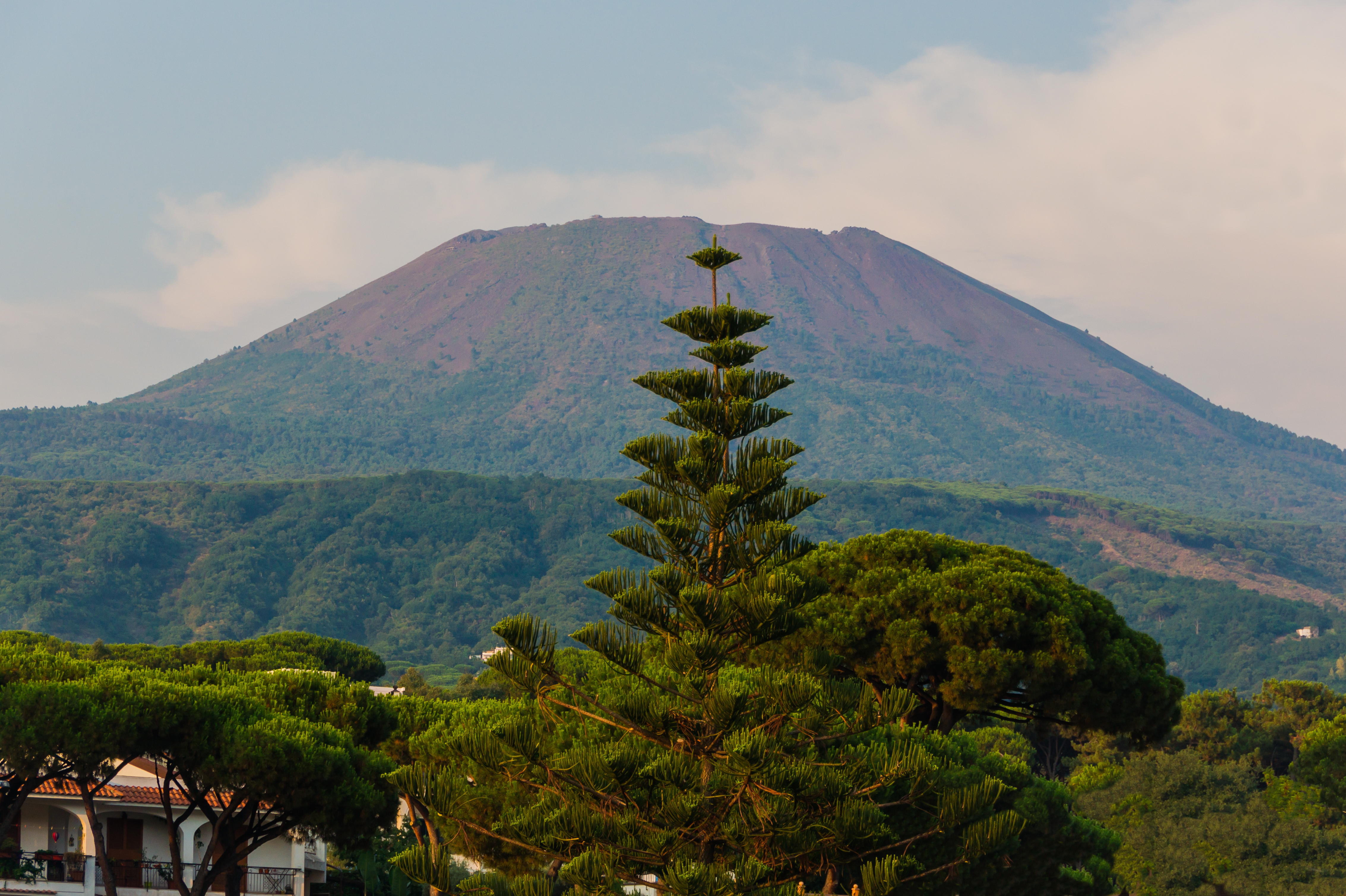Pliny the Elder represents the enduring legacy of a man who shaped the understanding of Roman civilization and natural science. Renowned for his ‘Natural History,’ the first encyclopedia, Pliny’s work captures the essence of a scholar whose observations laid the groundwork for future generations. Today, we reveal the expanse of his writing and examine how his observations continue influencing our perception of ancient knowledge.
Most Important Facts
- Pliny the Elder was a prolific Roman scholar and author. Not to be confused with his nephew Pliny the Younger.
- His diverse career included military service, where he rose through the ranks to become an admiral, and his writings contributed extensively to grammar, rhetoric, and history, avoiding politically sensitive topics under Nero since it could become dangerous for the writer.
- Pliny the Elder’s most celebrated work, ‘Natural History’, is considered the first encyclopedia, covering a vast area of topics from astronomy to botany, which influenced ancient Rome and continues to be a significant source of information for modern scholarship.

Pliny the Elder – Early Life And Family
Pliny the Elder, born in 23 AD in Novum Comum, Transpadane Gaul (today Como, Italy), embodied the intellectual spirit of his era. Pliny lived during the expansive era of the Roman Empire, and his upbringing, under the guidance of his parents Celer and Marcella, took place in this context. His family also included his sister, named Plinia. Pliny’s birthplace, Como, a town that rose to prominence during Julius Caesar’s rule in 49 BC, was historically significant, mirroring his future contributions to literature.
His sister Plinia remained familiar in history as the mother of Pliny the Younger, Roman magistrate, tutored by his uncle Pliny the Elder, who later adopted his nephew since he didn’t have children.

Education and Military Career
Pliny the Elder’s journey began with his legal studies in Rome, where he understood the significance of a well-structured argument, an idea as vital in legal discourse as in crafting a balanced IPA.
His early career saw him serve as a junior officer in the Roman army, a role that would serve as a stepping stone to his eventual rise through the ranks. As a junior officer, Pliny oversaw the well-being and training of his soldiers, ensuring their readiness for the responsibilities and adversities of military duty. This role, demanding as it was, provided him with an opportunity to hone his leadership skills, equipping him with the necessary experience for his later promotions. His dedication and skill earned him a promotion to cavalry commander during his service in Germany.
Pliny’s military career was marked by significant milestones. He began his journey in Germany, advancing to the position of cavalry commander before ultimately achieving the esteemed positions of senator and admiral responsible for the western Mediterranean Sea.
His progression through the military hierarchy profoundly shaped his later career and life, elevating his social status and increasing his influence within the Roman Empire. During his military service, he established meaningful connections with several notable figures. Though the specific individuals are not documented in the available sources, these relationships played a crucial role in his social network and influence. Pliny’s legal education was rooted in the Roman legal system, which, at that time, lacked formal law schools and tuition fees. The system was based on familial connections and was more informal.
Influence on Pliny the Younger
Pliny’s bond with his nephew, Pliny the Younger, remains a testament to the depth of their familial and intellectual connection. As the maternal uncle of Pliny the Younger, Pliny the Elder played a significant role in his upbringing and education, fostering a shared appreciation for erudition that transcended their familial ties. Also, Pliny the Younger still remains the most valuable primary source for the life of his uncle.
According to his letters, Pliny the Younger portrayed his uncle as efficient, loyal, shrewd, and magnanimous which were the qualities held in high esteem.

Death of Pliny the Elder
Pliny the Elder perished due to asphyxiation caused by toxic gases during the eruption of Mount Vesuvius, while he was located on the shores of Stabiae. His nephew, Pliny the Younger, meticulously chronicled this incident, highlighting his uncle’s courageous endeavor to rescue a friend. His death, while tragic, does not overshadow the significant contributions he made to scholarship and knowledge.
During the disastrous eruption of Mount Vesuvius in 79 AD, Pliny the Elder embarked on a rescue mission. Braving the danger, he attempted to investigate and aid the victims of the eruption, a decision that ultimately led to his demise due to asphyxiation from the toxic gases.
Despite his pre-existing respiratory issues, Pliny the Elder displayed immense bravery, coordinating a rescue mission to provide assistance to the victims of the volcanic eruption. His death on August 24, 79 AD, is a testament to his selflessness and courage.

Literary Work
Pliny’s literary contributions were as diverse as they were impactful. During Nero’s reign, he authored the twenty-volume Bella Germaniae (‘The History of Germany’) and a history of Rome’s German wars in twenty books. Despite Nero’s oppressive rule, since Nero grew more and more delusional, Pliny refrained from engaging in any literary endeavors that could draw unwanted attention to himself. It was quite dangerous if Nero noticed you, so this was very smart from Pliny.
Pliny also made significant contributions to the studies of grammar and rhetoric, authoring eight books referred to as Dubii sermonis. His works served as a testament to his scholarship, cementing his place in the annals of history as a prolific scholar and author. Probably one of the most influential scholars ancient Rome ever had.
During Nero’s reign, Pliny’s works concentrated on oratory, focusing on form rather than content, much like a brewer focusing on the balance of flavors rather than the ABV. His historical work, Bella Germaniae, shed light on the Roman campaigns against the Germans, providing valuable insights into the military tactics of the time, and also as a first-class source for future historians.
While navigating the political environment of Nero’s Rome, Pliny chose to live in semi-retirement, dedicating his time to studying and producing materials that were less politically sensitive. His contributions to the fields of grammar and rhetoric had a significant influence on education in Rome, playing a pivotal role in the teaching and study of these subjects.
With the advent of Vespasian’s rule, Pliny resumed his writing, dedicating his nights to literary pursuits while fulfilling his daytime military duties for the emperor. He completed Aufidius Bella Germaniae, which provided a historical account of the Roman campaigns in Germany.
Under Vespasian’s rule, Pliny’s influence on the literary scene was manifested through his dedication to Roman literature and the adoption of a straightforward writing style complemented by a broad vocabulary. This era held great significance for Pliny’s literary work, as it was the period in which he composed his most renowned and impactful piece, the Natural History. Free from the shackles of self-censure, after the death of Emperor Nero, Pliny’s talent was finally seen to its full extent.

Natural History: The First Encyclopedia
Commonly recognized as the first encyclopedia, Pliny the Elder’s Natural History stands as a significant accomplishment in the collation and organization of information. This extensive work, consisting of 37 volumes, was a testament to Pliny’s intellectual prowess and his commitment to disseminating knowledge. The Natural History encompassed a wide range of subjects, including astronomy, zoology, botany, medicine, magic, and art, showcasing the comprehensive nature of his work and its encyclopedic scope.
Natural History was a comprehensive work, meticulously compiled from various ancient authors and assimilating prevalent knowledge of Pliny’s time. This monumental masterpiece exerted influence on Ancient Roman society by serving as a prototype for encyclopedias and facilitating the dissemination of knowledge on subjects such as Roman gardens, early botanical literature, and the introduction of new species into Italy. These insights have been utilized by contemporary scholars for various academic studies, illustrating the enduring impact of Pliny’s work.
The influence of Natural History extended beyond Ancient Rome, profoundly affecting subsequent generations of scholars and shaping the development of culture, literature, art, and popular culture in later periods. It introduced new information and perspectives from the natural sciences, including paleoenvironmental and genetic data, offering crucial perspectives on ancient Rome and shaping contemporary analyses of his accounts, especially in the realm of Roman gardens and botanical history studies.
Summary
From his birth in ancient Como to his untimely demise during the eruption of Mount Vesuvius, Pliny the Elder’s life was as diverse as it was impactful. His contributions to the fields of law, military service, and literature highlight his versatility as a scholar and the breadth of his knowledge. His most significant work, Natural History, remains a vital source of insight into the knowledge and culture of ancient Rome.
His enduring influence on scholarship, particularly in the field of natural science, is a testament to his intellectual prowess and his commitment to sharing knowledge. Pliny the Elder, a scholar and author of ancient Rome, remains a beacon of knowledge, enlightening us about the ancient world and continuing to influence modern scholarship.
People Also Ask:
Why is Pliny the Elder so famous?
Pliny the Elder is famous for writing Natural History, an encyclopedic work that was an authority on scientific matters up to the Middle Ages. This work was the largest single surviving work from the Roman Empire and was of major importance.
What is Pliny the Younger famous for?
Pliny the Younger is most famous for his writings, particularly his collection of letters that provide crucial insight into the Roman world during his time. His letters offer valuable historical and cultural information.
Where was Pliny the Elder born?
Pliny the Elder was born in Novum Comum, Transpadane Gaul, which is now the city of Como, part of Italy.
What were some of Pliny the Elder’s significant literary contributions?
Pliny the Elder made significant literary contributions through his works such as the twenty-volume Bella Germaniae and the completion of Aufidius Bassus’s unfinished work. These contributions showcase his influence in Roman history and literature. And, of course, the famous Natural History, the first encyclopedia ever.
What is the significance of Pliny the Elder’s Natural History?
Pliny the Elder’s Natural History is regarded as the inaugural encyclopedia, providing a comprehensive overview of various subjects, including astronomy, zoology, botany, medicine, magic, and art. It holds a significant historical and educational value.
Hello, my name is Vladimir, and I am a part of the Roman-empire writing team.
I am a historian, and history is an integral part of my life.
To be honest, while I was in school, I didn’t like history so how did I end up studying it? Well, for that, I have to thank history-based strategy PC games. Thank you so much, Europa Universalis IV, and thank you, Medieval Total War.
Since games made me fall in love with history, I completed bachelor studies at Filozofski Fakultet Niš, a part of the University of Niš. My bachelor’s thesis was about Julis Caesar. Soon, I completed my master’s studies at the same university.
For years now, I have been working as a teacher in a local elementary school, but my passion for writing isn’t fulfilled, so I decided to pursue that ambition online. There were a few gigs, but most of them were not history-related.
Then I stumbled upon roman-empire.com, and now I am a part of something bigger. No, I am not a part of the ancient Roman Empire but of a creative writing team where I have the freedom to write about whatever I want. Yes, even about Star Wars. Stay tuned for that.
Anyway, I am better at writing about Rome than writing about me. But if you would like to contact me for any reason, you can do it at contact@roman-empire.net. Except for negative reviews, of course. 😀
Kind regards,
Vladimir
